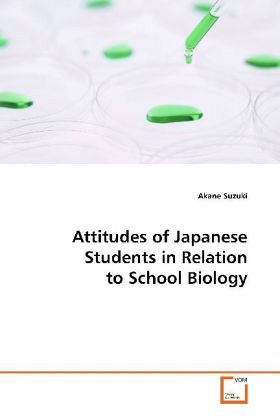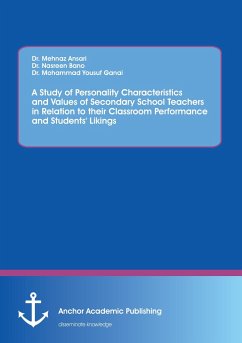
Attitudes of Japanese Students in Relation to School Biology
Versandkostenfrei!
Versandfertig in 6-10 Tagen
39,99 €
inkl. MwSt.

PAYBACK Punkte
20 °P sammeln!
This study explores attitudes in biology classes ofJapanese junior high school and high school students.It is argued that the aim of teaching biology is inproducing educated students who can understand theimportance of the role of biology in their societyand can make judgements or decisions based onbiological views. This study discusses definitions ofattitude and is based on one approach in theliterature. It would be helpful to understand whatcauses attitudes to develop and why students behavepositively or negatively in biology classes. Thesurvey was carried out with two different groups:Shoto...
This study explores attitudes in biology classes of
Japanese junior high school and high school students.
It is argued that the aim of teaching biology is in
producing educated students who can understand the
importance of the role of biology in their society
and can make judgements or decisions based on
biological views. This study discusses definitions of
attitude and is based on one approach in the
literature. It would be helpful to understand what
causes attitudes to develop and why students behave
positively or negatively in biology classes. The
survey was carried out with two different groups:
Shotoku gakuen High School and Meiji daigaku huzoku
nakano hachioji High School(1270 students in total)
using a questionnaire. In general, attitudes toward
learning biology decline with age, and boys and girls
tend to have different interests. The study offers
proposals for future research and implications for
teaching in Japan.
Japanese junior high school and high school students.
It is argued that the aim of teaching biology is in
producing educated students who can understand the
importance of the role of biology in their society
and can make judgements or decisions based on
biological views. This study discusses definitions of
attitude and is based on one approach in the
literature. It would be helpful to understand what
causes attitudes to develop and why students behave
positively or negatively in biology classes. The
survey was carried out with two different groups:
Shotoku gakuen High School and Meiji daigaku huzoku
nakano hachioji High School(1270 students in total)
using a questionnaire. In general, attitudes toward
learning biology decline with age, and boys and girls
tend to have different interests. The study offers
proposals for future research and implications for
teaching in Japan.












